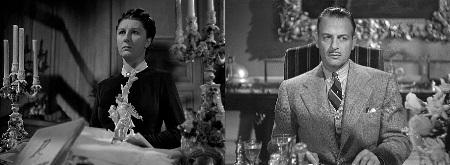The presentation of the movie Rebecca (1940) by director Alfred Hitchcock offers an interesting and smart premise to the ways psychological pressure can be expressed. The film begins the story from the middle of the larger tale, though details unexpectedly revealing and revealed so as to make the experience one that I enjoyed more than I thought I would. Hitchcock‘s first movie made in the United States with producer David O. Selznick is based on the 1938 Daphne du Maurier novel Rebecca.

The movie begins with a glimpse of ‘Maxim’ de Winter, as portrayed by Laurence Olivier, considering taking of his life at the edge of a cliff. A woman yells to him in an attempt to change his mind. The scenario ends with rudeness on behalf of de Winter, though the plot for the movie is cleverly planted with this simple yet strong interaction.

It would be in Monte-Carlo, Monaco where de Winter and the young lady unexpectedly meet again, with the young lady as a paid companion to the intentionally demonstrative and extravagant Mrs. Edythe Van Hopper. It is owing to Van Hopper that we, along with the young lady, learn that de Winter was recently widowed. Through a warmth the belied a distinctly different station in life, de Winter is taken with the young lady in this setting and proposes marriage. Florence Bates portrayed Mrs. Edythe Van Hopper to Joan Fontaine portraying the woman who would become the second Mrs. de Winter.

It would be at Maxim de Winter’s sprawling southwestern England estate, named Manderley, that we learn of the fondness that many serving the mansion and grounds were devoted to the first Mrs. de Winter. Rebecca would be the former lady of the house. The Manderley staff included Mrs. Danvers as housekeeper, Frank Crawley as Maxim’s estate manager, Frith, as a butler, and so forth. Judith Anderson, Reginald Denny and Edward Fielding portrayed Danvers, Crawley and Frith, respectively. Precisely how the staff worked to make the young Mrs. de Winter uncomfortable. That these truths rolled into our getting to know Jack Favell, Mrs. Rebecca de Winter’s cousin, ultimately makes the story one of greater depth than simple devotion to a prior lady of the house.

The story of Rebecca stands out among the earlier work offered by Alfred Hitchcock in that the psychological tension takes on distinct tones of loyalty, romance and questions of well-being at levels that intermingled so smartly that true motivations among the characters were, at times, less than straightforward. That the truth of who had done what and why becomes clear, my appreciation for the artistry presented makes me satisfied with the experience. I rate Rebecca as directed by Alfred Hitchcock 4.25-stars on a scale of 1-to-5.
Matt – Wednesday, September 7, 2022





